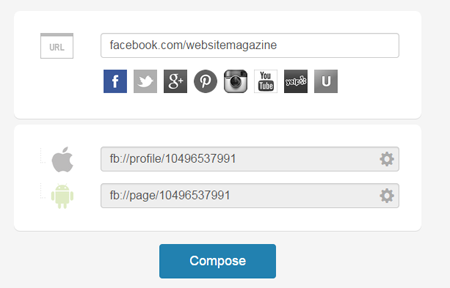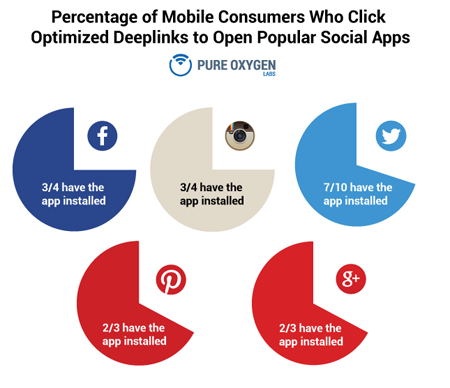Use Deep Links for Better SEO & Social

Roughly 60 percent of all time spent on social media is on smartphones and tablets and with nearly a half a billion mobile app users (as of last count) for Facebook alone, businesses would be wise to cater to that audience in every possible way. Deep linking is one option. In fact, there is speculation that Google may reward companies who use these hyperlinks in the mobile environment, but more on that later.
First, what is deep linking? A very common use-case is as follows: A user accesses a mobile site on his smartphone and clicks on a social media icon.
Without deep linking, Facebook.com, for example, will open in his browser, even if he has - and likely prefers - the Facebook app already installed on his phone. Alternatively, when a company uses a service like URLgenius (that resembles a link shortening service, see image below) from Pure Oxygen Labs to deep link their social icons, the user's Facebook app will open (rather than his browser). If the user does not have the Facebook app, he will be directed to Facebook.com within his browser. This is part of URLgenius's "app-detection process."

Pure Oxygen Labs Founder and CEO Brian Klais calls this practice, "adaptive deep linking," where each user gets the experience that is optimized for his or her device. Part of the requirements for doing deep linking correctly, according to Klais, is providing a fallback experience for those who don't have the app. For social media, that's not many. According to Pure Oxygen Labs, mobile users who click social links overwhelmingly have that app installed (66 - 75 percent of the time).

There are, of course, many other use-cases for deep linking, including ecommerce functions, like a person searching for a product. If they have that retailer's app, they'd probably like to use it. With deep linking, if there is an equivalent page within the app, they're directed there. Brands would probably prefer it too, because (1) they spent resources developing the app and (2) their apps likely contain features, such as barcode scanning, that are not available on the mobile Web.
Enter: Google
Currently there is not a huge ranking benefit from doing deep linking, according to Klais, but there could be a quasi-ranking benefit from the higher engagement levels it could bring. A problem that brands need to solve this year, however, is providing URLs within an app. Once a brand has URLs within their app, they can take advantage of app indexation.
Google reports that app indexing lets it index apps just like websites, stating, "Deep links to your Android app appear in Google Search results, letting users get to your native mobile experience quickly, landing exactly on the right content with your app."
In short, according to Klais, a search listing for Anroid users could now have two options: (1) open up the brand's app to that page or (2) open the Web page.
"All of a sudden Google is adding the ability to mark up your mobile search results to get people from mobile search results to a deep place within your app," said Klais. "In time, maybe 2016, I would predict we'll see mobile ranking benefit for pages with app indexation. Are there certain features on the app and not on the mobile website? Then if Google is able to index the app page, it will rank it higher than a mobile page. It's still new. This is still a time of exploration, but it's a really powerful ability to rank app content higher. For now, it's about driving more app engagement."
Google recommends following these steps to adding deep links within an app.









